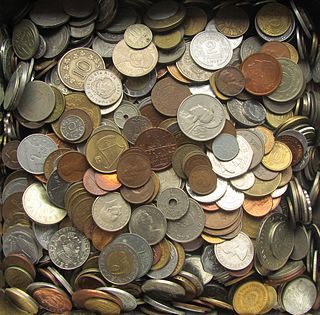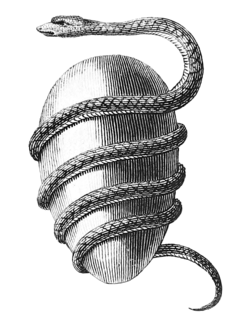
A coin is a small, flat, round piece of metal or plastic used primarily as a medium of exchange or legal tender. They are standardized in weight, and produced in large quantities at a mint in order to facilitate trade. They are most often issued by a government. Coins often have images, numerals, or text on them. Obverse and its opposite, reverse, refer to the two flat faces of coins and medals. In this usage, obverse means the front face of the object and reverse means the back face. The obverse of a coin is commonly called heads, because it often depicts the head of a prominent person, and the reverse tails.
The giant panda is a bear from the family Ursidae.

Phanes or Protogonus was the mystic primeval deity of procreation and the generation of new life, who was introduced into Greek mythology by the Orphic tradition; other names for this Classical Greek Orphic concept included Ericapaeus or Erikepaios and Metis ("thought").
Joscelyn Godwin is a composer, musicologist, and translator, known for his work on ancient music, paganism, and music in the occult.
$1 primarily refers banknotes, bills or coins, including:

Vanessa is a genus of brush-footed butterflies in the tribe Nymphalini. It has a near-global distribution and includes conspicuous species such as the red admirals, the Kamehameha, and the painted ladies of the Cynthia group : Painted lady, American painted lady, West Coast lady, Australian painted lady, etc. For African admirals, see genus Antanartia. Recently, several members traditionally considered to be in the genus Antanartia have been determined to belong within the genus Vanessa.
An imago is the last stage of development of an insect.

Euploea eunice, commonly called blue-banded king crow, is a butterfly found in the Indomalayan realm that belongs to the crows and tigers, that is, the Danaid group of the brush-footed butterflies family.
Phanes are abstractions of highly complex organic molecules introduced for simplification of the naming of these highly complex molecules.

The Last Castle is a science fiction novella by American writer Jack Vance published in 1966. It won the 1966 Nebula Award for Best Novella and the 1967 Hugo Award for Best Novelette. It is about a future civilization of wealthy nobles who live in high-tech castles, which are maintained by an enslaved alien race, the Meks. After centuries of slavery, the Meks revolt, destroying the castles and slaughtering their elite inhabitants, until only one castle is left.

The Orphic Egg in the Ancient Greek Orphic tradition is the cosmic egg from which hatched the primordial hermaphroditic deity Phanes/Protogonus, who in turn created the other gods. The egg is often depicted with the serpent-like creature, Ananke, wound about it.

The Temple of Artemis or Artemision, also known as the Temple of Diana, was a Greek temple dedicated to an ancient, local form of the goddess Artemis. It was located in Ephesus. It was completely rebuilt twice, once after a devastating flood and three hundred years later after an act of arson, and in its final form was one of the Seven Wonders of the Ancient World. By 401 AD it had been ruined or destroyed. Only foundations and fragments of the last temple remain at the site.
Cigaritis phanes, the silvery bar, is a butterfly of the family Lycaenidae. It is found in south-west Africa, including Botswana, Zimbabwe and South Africa. In South Africa it is found from north-western KwaZulu-Natal to the northern part of the Free State, Gauteng, Mpumalanga, Limpopo, North West and Northern Cape.

Phanes of Halicarnassus was a wise council man, a tactician, and a mercenary from Halicarnassus, serving the Egyptian pharaoh Amasis II. Most of what history recounts of Phanes is from the account of Herodotus in his grand historical text, the Histories. According to Herodotus, Phanes of Halicarnassus was "a resourceful man and a brave fighter" serving Amasis II on matters of state, and was well connected within the Egyptian pharaoh's troops. Phanes of Halicarnassus was also very well respected within the military and royal community of Egypt.

The Phanes coins, so called for the name inscribed on them, are early electrum coins from Caria in Asia Minor and are the most ancient inscribed coin series at present known.

Numismatic charms are coin-like amulets and talismans from various cultures, which include:
This page is based on this
Wikipedia article Text is available under the
CC BY-SA 4.0 license; additional terms may apply.
Images, videos and audio are available under their respective licenses.








